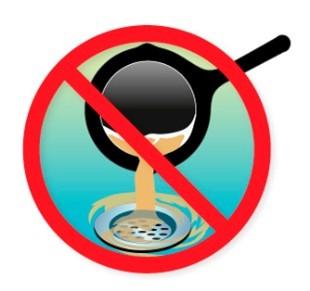Message from the Water Recycling Center

Fats, oils, and grease (FOG) are a problem for our sewer pipes. Over time, the FOG hardens in the sanitary sewers and even private laterals and cause blockages. These blockages lead to sewer backups and basement backups. Therefore, it is in your best interest to dispose of cooking oils, fats, and grease properly. One way to do this is to drain the oil into a sealable container that can be placed into your regular household trash. You can also wipe off the grease and fat using a paper towel and dispose of that into the trash. Additionally, your garbage disposals do not prevent FOG blockages. So please still discard food solids, oils, and grease properly because garbage disposals do not solve the problem. These proper disposal practices can save the city and you, the homeowner, a lot of unnecessary headaches and money.
High concentrations of chlorides (salt) can negatively affect aquatic life and receiving water bodies therefore we want to limit it as much as possible. The best way to do that is stopping it at its source. Residential water softeners contribute a great deal of chlorides to the wastewater treatment plant. Homeowners can remedy this problem by fine tuning their water softeners to soften their water just as much as needed. On demand water softeners use just as much salt as needed to treat your hard water. The rule of thumb is that if your water softener is 14 years old or older, it should be replaced because it has lost its efficiency over time. This will be a cost savings to the homeowner as well because “on demand” water softeners require less salt usage.

